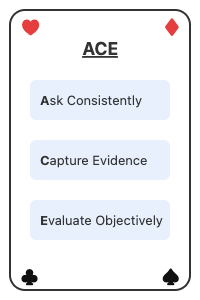Welcome to Introducing Behavioral Interviewing for Software Engineers.
Building a high-performing engineering team isn’t just about finding people with strong coding skills — it’s about identifying candidates who can work well with others, adapt to change, and solve real-world problems. Technical ability is important, but it’s collaboration, communication, and resilience that truly set great engineers apart. As an interviewer, mastering behavioral interviewing helps you surface these qualities and make better hiring decisions for your team.
In this course, you’ll learn how to:
- Understand what behavioral interviewing is and why it matters for software engineers.
- Know how to balance behavioral and technical interviewing in your hiring process.
- Use behavioral interviews to assess cultural and team fit based on real past experiences.
- Identify the key soft skills that are most important for your team’s success.
By the end of this lesson, you’ll know how to use behavioral interviewing to get a clearer, more complete picture of how someone will perform on an engineering team.
Behavioral interviewing is a technique that focuses on real examples from a candidate’s past experiences, rather than hypothetical scenarios or brainteasers. The core idea is simple: past behavior is the best predictor of future performance. Instead of asking,
- “How would you handle a team conflict?”
you ask, - “Tell me about a time you had a disagreement with a teammate and what you did about it.”
This approach is especially important for software engineers because great teams aren’t built on technical skills alone. Success depends on communication, adaptability, and problem-solving — especially when things get tough. Behavioral interviews reveal how a candidate collaborates, handles pressure, and recovers from setbacks. The table below shows how specific behavioral questions can help you assess these key skills:
By adding behavioral interviews, you get a more realistic view of how someone will handle the day-to-day challenges of engineering work and whether they’ll thrive on your team.
Behavioral interviews are only as effective as the structure and consistency behind them. To help you remember the key principles, use the simple ACE framework:
- Ask consistently
- Capture evidence
- Evaluate objectively

Here’s how ACE can guide your approach:
- Ask consistently: Use the same core questions for every candidate to ensure fairness and structure.
- Capture evidence: Listen for specific actions and results, not just general statements. Take notes on what the candidate actually did.
- Evaluate objectively: Assess responses using clear criteria and evidence, rather than relying on gut feelings.
By applying the ACE framework, you’ll make your behavioral interviews more reliable, fair, and focused on the qualities that matter most for your team.
Here’s how this might sound in a real conversation:
- Natalie: Hey Ryan, I’m prepping for my first round of interviews. I know how to ask technical questions, but I’m not sure how behavioral interviewing really works in practice.
- Ryan: Great question! With behavioral interviewing, you want to follow the ACE framework: Ask consistently, Capture evidence, and Evaluate objectively. For example, instead of asking, “How would you handle a team conflict?” you’d ask, “Tell me about a time you had a disagreement with a teammate and what you did about it.”
- Natalie: So I should look for specific stories, not just general answers?
- Ryan: Exactly. That’s the Capture evidence part—listen for what actions they took and what the outcome was. And when you evaluate, make sure you’re using clear criteria, not just your gut feeling. For example, if someone says, “I helped my team resolve a disagreement by organizing a meeting and making sure everyone was heard,” that’s much more useful than just “I’m a good team player.”
- Natalie: That makes sense. So I should ask the same questions to each candidate, take notes on what they actually did, and use clear criteria to evaluate their answers.
